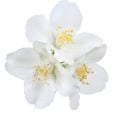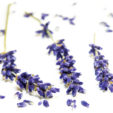Valentine’s Day is right around the corner, how about giving a bouquet of tisanes that feature flowers? Five flowers—rose, marigold, jasmine, lavender and hibiscus—are refreshing and provide great health benefits. An herbal tea bouquet is a gift that keeps on giving.
 Also known as rose bud tea, rose tisane is composed of whole rose blossoms or dried rose petals of mature roses. It is popular in the Middle East and has a fruity taste. It is rich in antioxidants like vitamin C, ellagic acid and quercetin. It also contains polyphenols. It has been known to aid in the treatment of menstrual cramps, digestive difficulties, depression, insomnia and improves liver function. It is not to be confused with rosehip tea, which comes from the fruit of the rose plant.
Also known as rose bud tea, rose tisane is composed of whole rose blossoms or dried rose petals of mature roses. It is popular in the Middle East and has a fruity taste. It is rich in antioxidants like vitamin C, ellagic acid and quercetin. It also contains polyphenols. It has been known to aid in the treatment of menstrual cramps, digestive difficulties, depression, insomnia and improves liver function. It is not to be confused with rosehip tea, which comes from the fruit of the rose plant.
 Also known as calendula, marigold tisane comes from a bright yellowish-orange flower. It is known for its anti-inflammatory, antifungal and antispasmodic properties. It sooths digestion and supports the immune system. As with rose tea, dried marigold petals are used in making tea. Calendula’s flavor has a hint of bitterness.
Also known as calendula, marigold tisane comes from a bright yellowish-orange flower. It is known for its anti-inflammatory, antifungal and antispasmodic properties. It sooths digestion and supports the immune system. As with rose tea, dried marigold petals are used in making tea. Calendula’s flavor has a hint of bitterness.
 The more than 150 types of Jasmine flowers, also known as Mogra, have pleasantly strong, distinctive aromas. The taste is subtly sweet. The Jasmine flower is native to Persia and India. Records show it was also consumed in China by royalty as early as the Song Dynasty, which concluded during the 13th century and made its way to Europe in the 16th century. It has been labeled as a “women’s plant” since it has been used as an aphrodisiac and to heal the female reproductive system and relax the uterus, according to Herbs-Treat and Taste.
The more than 150 types of Jasmine flowers, also known as Mogra, have pleasantly strong, distinctive aromas. The taste is subtly sweet. The Jasmine flower is native to Persia and India. Records show it was also consumed in China by royalty as early as the Song Dynasty, which concluded during the 13th century and made its way to Europe in the 16th century. It has been labeled as a “women’s plant” since it has been used as an aphrodisiac and to heal the female reproductive system and relax the uterus, according to Herbs-Treat and Taste.
 Lavender is bright purple and has a calming fragrance. It is native to the mountains of the Mediterranean region. Known to induce relaxation, it has been shown to reduce stress levels. Lavender has been used to relieve indigestion.
Lavender is bright purple and has a calming fragrance. It is native to the mountains of the Mediterranean region. Known to induce relaxation, it has been shown to reduce stress levels. Lavender has been used to relieve indigestion.
 Hibiscus is a bright red flower. It has a bit of a sour taste and is sometimes referred to as “sour tea.” It is packed with vitamin C, antioxidants and minerals. It has anti-inflammatory properties and lowers blood pressure in pre-hypertensive and mildly hypertensive adults, according to a report by the American Heart Association, published in November 2008.
Hibiscus is a bright red flower. It has a bit of a sour taste and is sometimes referred to as “sour tea.” It is packed with vitamin C, antioxidants and minerals. It has anti-inflammatory properties and lowers blood pressure in pre-hypertensive and mildly hypertensive adults, according to a report by the American Heart Association, published in November 2008.
Rose
 Also known as rose bud tea, rose tisane is composed of whole rose blossoms or dried rose petals of mature roses. It is popular in the Middle East and has a fruity taste. It is rich in antioxidants like vitamin C, ellagic acid and quercetin. It also contains polyphenols. It has been known to aid in the treatment of menstrual cramps, digestive difficulties, depression, insomnia and improves liver function. It is not to be confused with rosehip tea, which comes from the fruit of the rose plant.
Also known as rose bud tea, rose tisane is composed of whole rose blossoms or dried rose petals of mature roses. It is popular in the Middle East and has a fruity taste. It is rich in antioxidants like vitamin C, ellagic acid and quercetin. It also contains polyphenols. It has been known to aid in the treatment of menstrual cramps, digestive difficulties, depression, insomnia and improves liver function. It is not to be confused with rosehip tea, which comes from the fruit of the rose plant.
Marigold
 Also known as calendula, marigold tisane comes from a bright yellowish-orange flower. It is known for its anti-inflammatory, antifungal and antispasmodic properties. It sooths digestion and supports the immune system. As with rose tea, dried marigold petals are used in making tea. Calendula’s flavor has a hint of bitterness.
Also known as calendula, marigold tisane comes from a bright yellowish-orange flower. It is known for its anti-inflammatory, antifungal and antispasmodic properties. It sooths digestion and supports the immune system. As with rose tea, dried marigold petals are used in making tea. Calendula’s flavor has a hint of bitterness.
Jasmine
 The more than 150 types of Jasmine flowers, also known as Mogra, have pleasantly strong, distinctive aromas. The taste is subtly sweet. The Jasmine flower is native to Persia and India. Records show it was also consumed in China by royalty as early as the Song Dynasty, which concluded during the 13th century and made its way to Europe in the 16th century. It has been labeled as a “women’s plant” since it has been used as an aphrodisiac and to heal the female reproductive system and relax the uterus, according to Herbs-Treat and Taste.
The more than 150 types of Jasmine flowers, also known as Mogra, have pleasantly strong, distinctive aromas. The taste is subtly sweet. The Jasmine flower is native to Persia and India. Records show it was also consumed in China by royalty as early as the Song Dynasty, which concluded during the 13th century and made its way to Europe in the 16th century. It has been labeled as a “women’s plant” since it has been used as an aphrodisiac and to heal the female reproductive system and relax the uterus, according to Herbs-Treat and Taste.
Lavender
 Lavender is bright purple and has a calming fragrance. It is native to the mountains of the Mediterranean region. Known to induce relaxation, it has been shown to reduce stress levels. Lavender has been used to relieve indigestion.
Lavender is bright purple and has a calming fragrance. It is native to the mountains of the Mediterranean region. Known to induce relaxation, it has been shown to reduce stress levels. Lavender has been used to relieve indigestion.
Hibiscus
 Hibiscus is a bright red flower. It has a bit of a sour taste and is sometimes referred to as “sour tea.” It is packed with vitamin C, antioxidants and minerals. It has anti-inflammatory properties and lowers blood pressure in pre-hypertensive and mildly hypertensive adults, according to a report by the American Heart Association, published in November 2008.
Hibiscus is a bright red flower. It has a bit of a sour taste and is sometimes referred to as “sour tea.” It is packed with vitamin C, antioxidants and minerals. It has anti-inflammatory properties and lowers blood pressure in pre-hypertensive and mildly hypertensive adults, according to a report by the American Heart Association, published in November 2008.
